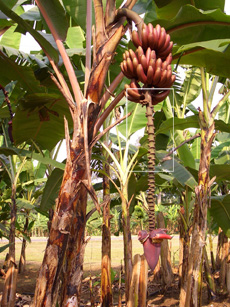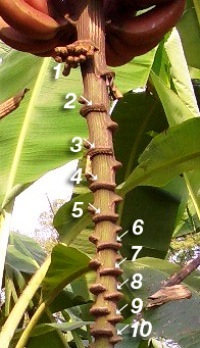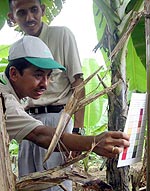Characterization of cultivated banana and wild types
|
Practicing characterization at a training course (photo: Bioversity) |
Contributors to this page: Bioversity International, France (Anne Vezina, Stéphanie Channeliere).
The Descriptors for Bananas, published in 1996 by Bioversity (then IPGRI and INIBAP), include the characterization descriptors developed by the French Agricultural Research Centre for International Development, CIRAD. This comprehensive list of 126 descriptors is intended to guide curators in deciding which ones are most useful to describe the material in their collection. It is not expected that all the descriptors will need to be recorded.
A set of Key access and utilization descriptors for banana have recently been developed by Bioversity International and an international advisory group (2009).
When to record descriptors
The best time to record the descriptors is when the fruit are well-filled, green-ripe or just turning yellow, and the rachis is at least 45 cm long. It should be noted however that, according to their nature, some of the descriptors will need to be recorded at a different time.
On a plant that loses its bracts, the optimal development stage to record descriptors can be confirmed by counting the number of nodes (the scars made by the fallen bracts) on the rachis, as shown below. Bracts fall off at the rate of one a day, revealing three parallel spirals. Counting 20 nodes on any of the three spirals means that plant flowered 60 days before. This is the point after which rapid change no longer occurs.
 |
 |
|
The photos above show the first ten nodes/scars of the first spiral, which continues on the back of the rachis. The spiral has to have at least 20 nodes to be at the optimal development stage for recording most of the descriptors. (photos: Bioversity) |
|
To ensure maximum expression of the characters to be recorded, the plants should be grown in an environment conducive to their development. The regeneration guidelines describe how to manage a field collection to obtain optimal growth conditions (see regeneration guidelines for banana).
Photographic descriptors
Photographic descriptors are useful to complement and corroborate the information obtained using the characterization descriptors. The photos can also be used by taxonomic experts to establish the identity of an accession. They should be taken when the characterization descriptors are recorded. Below are instructions on how to capture the photographic descriptors.
|
|
References and further reading
Bioversity International. 2009. Key access and utilization descriptors for banana genetic resources. Bioversity International, Rome, Italy. Available here.
IPGRI, INIBAP, CIRAD. 1996. Descriptors for Banana (Musa spp.). IPGRI, Rome, Italy; INIBAP, Montpellier, France; CIRAD, France. 55 pp. Available here.
Ploetz RC, Kepler AK, Daniells J, Nelson SC. 2007. Banana and plantain - an overview with emphasis on Pacific island cultivars. Available from: http://www.agroforestry.net/tti/Banana-plantain-overview.pdf. Date accessed: 23 March 2010.
Simmonds NW, Weatherup STC. 1990. Numerical taxonomy of the cultivated bananas. Tropical Agriculture 67 (1):90-92.
Simmonds NW, Weatherup STC. 1990. Numerical taxonomy of the wild bananas (Musa). New Phytologist 115 (3):567-571.
Simmonds NW, Shepherd K.1955. The taxonomy and origins of the cultivated bananas. Journal of the Linnean Society 55:302-312.






Leave your comments
Post comment as a guest